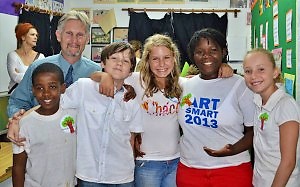
Bishop Mackenzie International School
Grade 6 students from Bishop Mackenzie Intenational School (BMIS) in Lilongwe, Malawi spent over a month researching for a presentation on various aspects of Permaculture. This was part of a school project in which different ‘teams’ of students were required to choose a subject, research it thoroughly, and then come up with unique ways to present their information. One of the groups chose Permaculture as their topic and turned to Never Ending Food for assistance. The group was comprised of Tadala Mitumbili, Max Kremer, Katyanna Horvath, Mwai Gwembere, and Maya Sangala (see picture from left to right).
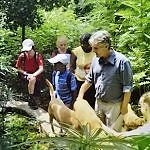
Never Ending Food
As part of their research, the group took a field visit to Never Ending Food to learn more about what Permaculture is and how it can be used to address some of the current problems that the world is facing. On this visit, the students learned about the importance of nutritional diversity (by harvesting and making their own nutritious snack)! They also learned about the creation of a good Permaculture Design, about the use of zones and guilds, and even about some appropriate technologies such as composting toilets, solar driers, and the making of paper briquettes for fuel.
The group also took a field visit out to the Kusamala Institute of Agriculture and Ecology where they met Never Ending Food‘s former Permaculture manager, Luwayo Biswick. Luwayo taught them about some of the principles of Permaculture such as every element performing many functions, every function being supported by many elements, and the efficient use of energy.
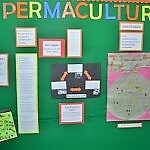
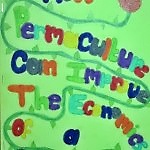
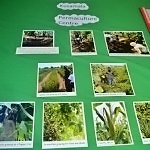
The group then took the information that they had gathered from their trips to Never Ending Food and Kusamala and approached the administrators at BMIS to see if they could be given an area of the school grounds to start implementing some of these ideas.
The management agreed to this idea and the students were given an area at the end of two school blocks where runoff water is channeled throughout the rainy season. This area also contains a water tap and some pre-existing useful resources such as a bamboo grove, nitrogen fixing trees, and a few fruit trees. As part of their planning, the students thought hard about creating the most functional and low-labor design for this area as was possible. They decided to channel the runoff water from the water tap into a banana pit and start creating herb and vegetable beds using compost that they found where grass clippings and organic matter had been piled up. This implementation is just the beginning of what they hope will become a school-wide effort to sustainably design every aspect of the school grounds.
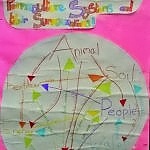
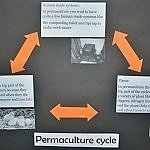
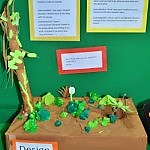
For the student’s presentation, they created a bulletin board with pictures of their field trips, stories and essays which they had written about Permaculture, illustrated ‘webs of interconnectivity,’ and their three main lines of inquiry which were comprised of: 1.) How environments are improved through the implementation or use of Permaculture, 2.) The interconnectedness between Permaculture systems and their surroundings, and 3.) How the use of Permaculture can improve the economics of a country. They even made a 3-dimensional models to help illustrate the use of diversified ‘guild’ systems and a PowerPoint display to highlight some of the main points of their display!
I was truly impressed, not only with the amount of time and energy that these students put into this project, but especially with the depth of understanding and insight that they demonstrated in presenting how Permaculture can be used to remedy current global challenges in economics, food security, and environmental degradation. The whole group should be extremely proud of their efforts! To help illustrate the ‘depth of understanding’, I leave you with a poem that one of the group members wrote for the presentation:
Permaculture Poem
By Tadala Mitumbili
Economics are bad.
We can make them better.
By doing the right thing.
We can do it altogether.
We can change the world using Permaculture.
We can assist and help each other.
We can make the world a better place.
And change it from a vast disgrace.
Permaculture can change the world.
For all of your children, both boy or girl.
We can make the world a green delight
Change it from its horrible sight.
Altogether we can unite.
We can make a garden, a beautiful sight.
But as is said, everything is useless by itself.
So let’s give the world some Permaculture help.
All donations go directly towards helping to spread Permaculture solutions throughout Malawi. Every little bit helps, and even a little can go a long way!
